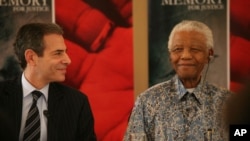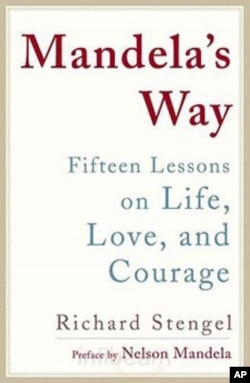Richard Stengel considers Nelson Mandela — anti-apartheid activist, Nobel Peace Prize winner and the man who led South Africa to democracy — to be an inspiring role model for everyone.
For nearly three years, the TIME magazine editor collaborated with the former South African president on his autobiography, "Long Walk to Freedom." Interviewing Mandela, traveling with him and listening to him think aloud, Stengel came to know Mandela as a leader, a freedom fighter and a man.
'Mandela's Way'
Now Stengel has written his own book, "Mandela's Way: 15 Lessons on Life, Love and Courage", which sums up lessons the African leader learned throughout his life.
"I wouldn't wish all the struggles that he had on anyone, but I think there are lots of lessons that he can teach us that we can use in our lives in everyday ways," says Stengel. "You don't have to be the head of a country or a revolutionary leader to understand some of these really important life lessons that he teaches."
Stengel found that leadership seemed to be in Mandela's genes.
"He came from a kind of aristocratic African background. His father was a headman of a tribe," he says. "When his father died, he was raised by the king of his local tribe. He was immersed in African historic customs. I think that helped shape him as a young man."
Formative years
But perhaps the most powerful influence on the Nelson Mandela we know today, Stengel says, was the 27 years the anti-apartheid activist spent in prison.
Initially a supporter of non-violent resistance, Mandela eventually established the military wing of the African National Congress, and led a campaign of bombing attacks against military and government targets. He was arrested and convicted of sabotage and other crimes against the state.
The man who emerged from prison at age 71, Stengel says, was a very different man than the one who went in.
"When he went into prison in 1964, he was this hot-headed, tempestuous revolutionary who wasn't always in control. And the man who emerged was a model of self-control and maturity. Prison taught him that in a way, because the only thing you could control in prison was yourself. That made him stronger rather than weakened him."
Prison also taught Mandela discipline and focus. Stengel says in his tiny prison cell, Nelson Mandela also discovered what courage means.
Meaning of courage
"Courage is not the absence of fear. Courage is triumphing over the fear that you have. He constantly told me that he had been terrified," he says. "I was amazed because here is this great hero telling me he was frightened. What he would say is that courage comes not from not being afraid, but from figuring out a way to suppress it, to overcome it, to tamp it down."
During his nearly three decades in prison, Mandela had enough time to come to understand white fears and black frustrations, according to Stengel. Mandela learned to look for the good in others and to put himself in the shoes of those who disagreed with him. That perspective helped him recognize that life is not simply black and white, but shades of gray.
"I used to ask him questions like, 'You embraced military maneuvers as a revolutionary because you thought you could topple the government or [because] you just wanted good PR for the fact that you guys were frightening?' His answer used to be, 'Why not both?' For Nelson Mandela, it's never either, or. It's always and, and both.' He sees both sides of different arguments. He thinks people are often too passionate, too certain about things that they shouldn't be certain about and that life is complex, that there are no black or white answers to questions."
Looking the part
Stengel writes that Mandela realized early on that paying attention to appearances — looking the part of a leader — was important.
"He always wore beautiful suits when he was a young man. But the lesson is larger than that. He basically says you have to sort of look and pretend to be the thing we want to be. If you want to be a leader, you have to act like a leader. If you want to be an artist, you have to look and act like an artist."
According to Stengel, it was as a youth in the South African countryside that Mandela learned another valuable leadership skill: how to lead both from the front and the back.
Leading from behind
"Lead from the front is the more conventional kind of leading that we know — getting up on the podium and giving a speech or saying follow me. But leading from the back is a different idea. We used to take these early morning walks in the countryside near where he grew up. He once asked me if I ever herded cattle before. I said, 'no.'
He said, 'It's interesting because there are lessons for leadership because the way you herd cattle is you lead them from behind. You find the most able and smartest cattle and have them lead the way. You empower them.' He said that's a good lesson for all of us. You basically have to kind of share the wealth. You have to find people who can execute your vision and ideas. I think that's relevant not only in politics, but again even within families."
Stengel says his friendship with Mandela changed his life in a very personal way:
"I met a young woman photographer in South Africa whom Mandela knew before I did. When we started dating, he urged us each to marry the other because he thought it was a match made in heaven. He was both the godfather to our marriage and he became a godfather to both of my sons. Both of them have middle names that come from Mandela's real name."
Stengel says "Mandela's Way" sums up the wisdom of a leader who came to understand that his role in politics and in life was to set the course — and let others steer the ship.













